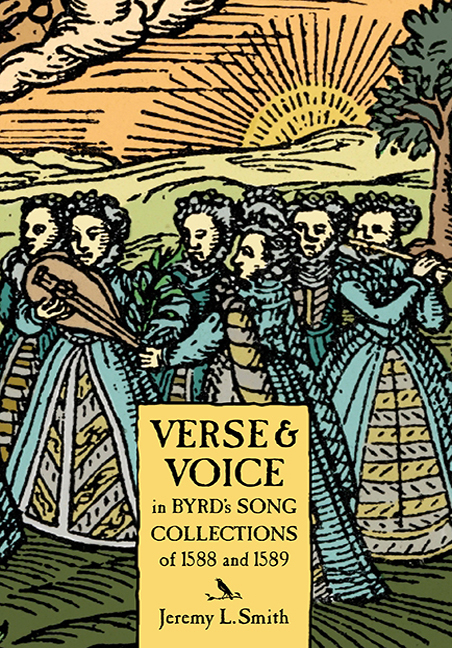Book contents
- Frontmatter
- Contents
- List of Figures
- List of Music Examples
- Preface and Acknowledgements
- Editorial Conventions
- Introduction
- CHAPTER 1 Psalmes
- CHAPTER 2 Sonets & Pastoralls, I
- CHAPTER 3 Sonets & Pastoralls, II
- CHAPTER 4 Sonets & Pastoralls, III
- CHAPTER 5 Songs of sadnes and pietie
- CHAPTER 6 Songs of Three Parts
- CHAPTER 7 Songs of Four Parts
- CHAPTER 8 Songs of Five Parts
- CHAPTER 9 Songs of Six Parts
- Conclusion
- Select Bibliography
- Index
- Studies in Medieval and Renaissance Music
CHAPTER 7 - Songs of Four Parts
Published online by Cambridge University Press: 05 July 2016
- Frontmatter
- Contents
- List of Figures
- List of Music Examples
- Preface and Acknowledgements
- Editorial Conventions
- Introduction
- CHAPTER 1 Psalmes
- CHAPTER 2 Sonets & Pastoralls, I
- CHAPTER 3 Sonets & Pastoralls, II
- CHAPTER 4 Sonets & Pastoralls, III
- CHAPTER 5 Songs of sadnes and pietie
- CHAPTER 6 Songs of Three Parts
- CHAPTER 7 Songs of Four Parts
- CHAPTER 8 Songs of Five Parts
- CHAPTER 9 Songs of Six Parts
- Conclusion
- Select Bibliography
- Index
- Studies in Medieval and Renaissance Music
Summary
IN the songs a 4 of the 1589 Songs of sundrie natures Byrd's auditor approaches the middle portions of an intricate sequential narrative. Already in the a 3 section Byrd had moved his audience from the great “gravitie” of penitential psalms through images of Mary Queen of Scots and Christ, only to settle in the mischievously “myrth[ful],” but ultimately innocent, world of Anacreontic Love (to quote from Byrd's title page, BE 13, p. xxxv). This was a complex enough path, but in the section of songs in four parts, to abide by Peter Brooks's claims about a good narrative, before we reach
a moment when past and present hold together in a metaphor – which may be that recognition or anagnorisis which, said Aristotle, every good plot should bring – [we must endure] the slidings, the mistakes, and partial recognitions of the middle. The “dilatory space” of narrative, as [Roland] Barthes calls it – the space of retard, postponement, error, and partial revelation – [is] the place of transformation: where the problems posed to and by initiatory desire are worked out and worked through.
Brooks here suggests that the middle part of a narrative is thoroughly messy, yet all this “dilatory space” turns out to be crucial for the plot: the middle is ultimately “the place of transformation.”
Byrd lives up to such expectations at this point of the sequence, though it is only near the end of the section where things shift into disarray. Up to that point his plot line is clear. Following the suggestions of six lines or so in Sir Philip Sidney's “Poor painters oft,” of his Old Arcadia (which will be quoted below under the appropriate section headers), Byrd puts the male poetic speaker under Cupid's thrall (BE 13: 15–21) and leads him toward the darkest place imaginable (BE 13: 22).
- Type
- Chapter
- Information
- Verse and Voice in Byrd's Song Collections of 1588 and 1589 , pp. 166 - 192Publisher: Boydell & BrewerPrint publication year: 2016



